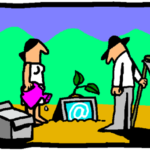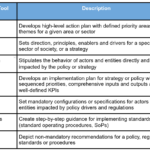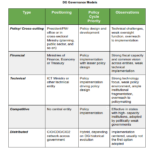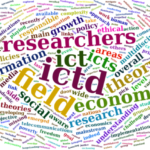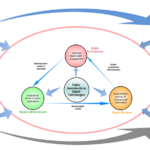This is a reply to one of the techies of the KM group who inexplicably went after a few comments I posted on the Development 2.0 space.Go figure!
Hi Johannes,
I have been fortunate enough to have been in UNDP since it first started using ICTs for our development programmes, back in 1992. The core driver that got us involved was certainly not the now infamous “digital divide” but rather the Earth Summit in Rio that tool place that same year. The main purpose of our support was to bring to policy makers in developing countries relevant and up to date information on sustainable development issues so that they could make “better informed decisions”. This was indeed part of Agenda 21, a plan of action on development and environment agreed in the Rio Summit by over 180 countries (sort like the MDGs, but for the environment). We at UNDP thought that we should try to accomplish that apparently simple goal using new solutions and tools, i. e. the new ICTs – which back then was limited mostly email, ftp and gopher in the best cases. In a sense, we got a bit lucky as the following year saw the launching of the first web browser which did change the way most saw the relevance of the Internet (BTW, many inside and outside UNDP we quite skeptical about using technologies for development; and some even opposed it openly!)
Since then, UNDP has been promoting the use of old, new, newer and emerging ICTs as an enabler for development, as a catalytic tool to enhance human development. UNDP has always steered away of the “digital divide” agenda which, as we all know, is just a reflection of existing socio-economic inequalities in development countries. This was not a priority for developing countries back then, given their other critical development challenges, nor should it be now.
So I am afraid is is not at all accurate to assume that ICT for Development is all about the “digital divide”. I am aware that many of the initiatives undertaken back did had such approach -and plenty of them did not succeed. No surprises here. Being that as it may, I cannot certainly speak for other UN agencies and organizations. All I know is that for us in UNDP we have always seen ICTs as a catalyst, a transformative one indeed, that can help bridge traditional development gaps, foster democratic governance and enhance human development.
The second point in your brief comment (I also saw your longer blog post on the subject which I will comment on separate post) is the good old “new way and a new culture … to do things”. It is old because it has been said so many times not only with the emergence of the Internet but also with older technologies (telegraph, phone, radio, tv, etc.) . Allow me to quote from an older publication talking about a “new”technology of the time:
“It is often said that [this technology] has altered the world. In the same way, people often speak of a new world, a new society, a new phase in history, being created – ‘brought about’- by this or that technology…Thus we often discuss, with animation, this or that ‘effect’ of [this technology], or of the kinds of social behaviour, the cultural and psychological conditions which [this technology] has ‘led to’…”
Sounds familiar, right? Guess which technology is being described here…
In any event, I do not think we should get stuck on particular nomenclature issues. Perhaps more important is not to forget that UNDP has a clear development mandate; and our job is to make such mandate a reality on the ground by assisting COs and partners in developing countries in implementing their developing agendas, in achieving the MDGs, by giving voice to people so they can have a saying on the future of their own lives and by confronting the challenges of climate change, natural disasters and and conflict. And as I see it, ICTs, while not a panacea, can play a role in most of these issues, as we have shown with some of the work we have done in past and continue to do today.
Finally, we are also working on mobile technologies an areas that in my view there is a much larger chance of reaching the poorest of the poor, as India and other developing countries are doing. I this see this area as critical for any of our development work (no matter what version, 1.0, 2.0 or 3.1!).
Cheers, Raúl

